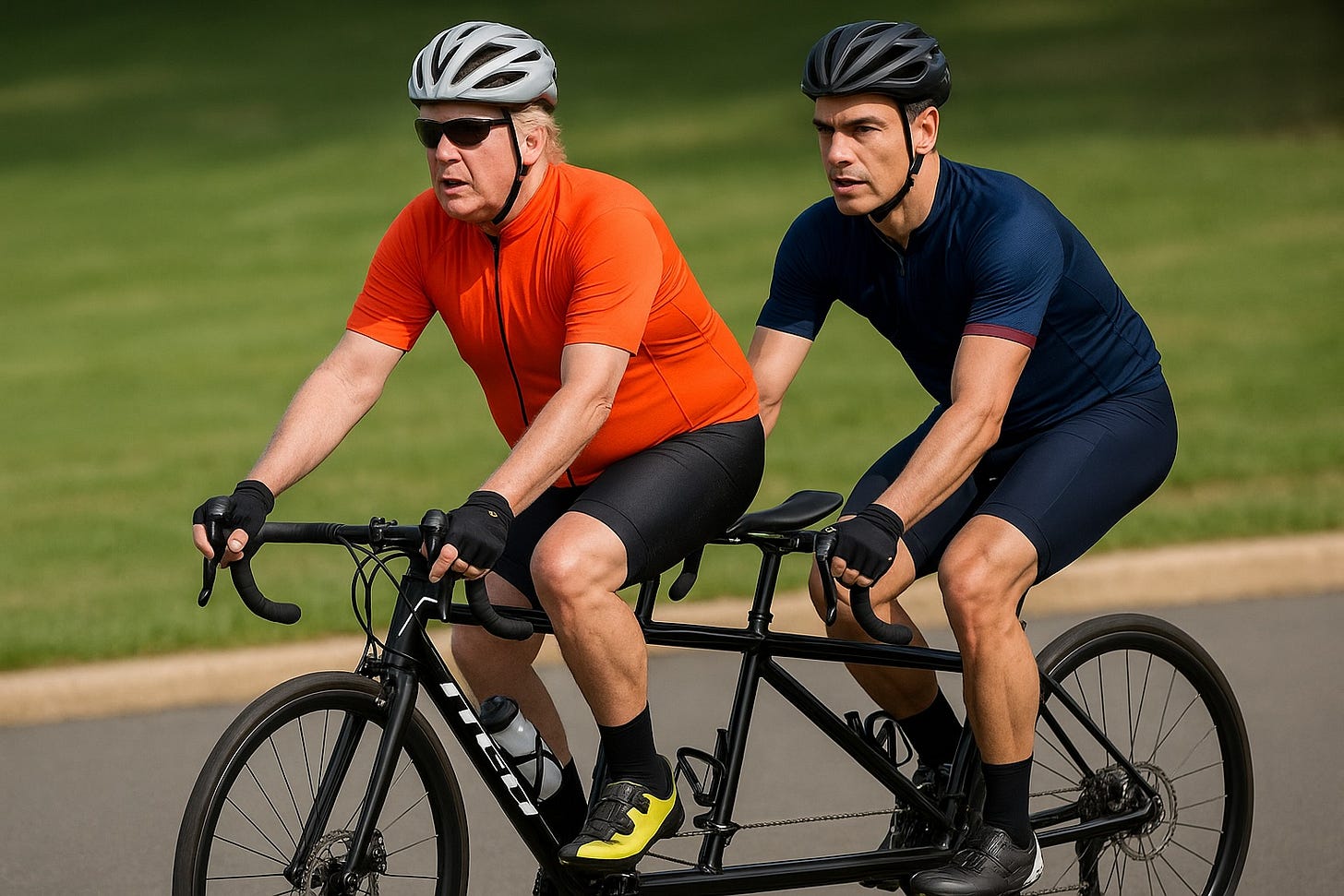🤝 Sánchez and Trump join forces to put their finger in the wound of sports
Is there any way we can keep insisting that politics and sports don’t mix?
They don’t talk and they don’t even look at each other, but Prime Minister Pedro Sánchez and U.S. President Donald Trump apparently agree on one thing: the time has come to stick their finger in the wound of sports. Shocked? Read on.
Sánchez likes sports—he’s been playing basketball since his youth—but it’s likely he’s now also a fan of cycling. Why? Because he’s just opened a Pandora’s box that benefits him while forcing sports to face an uncomfortable question: to what extent can we keep insisting that politics and sports go—or should go—separate ways?
Addicted to walking the tightrope, Sánchez has regained some sparkle and joy in his expression these last few days after facing what may have been the toughest weeks he’s had to face as Prime Minister of Spain. He is certain that what’s happening in Gaza is genocide. He says it loud and clear, moving confidently on the issue, fully aware that he has the overwhelming support of the Spanish public behind him.
So much so, in fact, that the Partido Popular (PP) is also walking a tightrope, desperately seeking to square the circle: criticizing the PM without alienating a huge portion of its own voters—many of whom think exactly the same as those who support the PSOE, and even those on the far left.
What is striking about Sánchez, who follows the war in Ukraine from a second row among European leaders, is that, beyond the undeniable political gain he is getting, he is also helping lead global sports towards a probable crisis. And in that, he is an unexpected main character. After the unprecedented images of thousands of people preventing the normal development of La Vuelta, an imitation effect is now guaranteed. In a world increasingly in disarray, expecting sports to maintain the order of more predictable and structured times is, at best, illusory.
Ask Donald Trump, who only a few weeks ago, with the World Cup trophy in his hands, asked Gianni Infantino, the FIFA president, a question of devastating candor (and danger): “Can I keep it?”
Infantino gave a confused answer, but by then it didn’t matter: the 2026 World Cup, which at its origin was the “United” bid that included the United States, Mexico, and Canada, is now Trump’s World Cup. A World Cup in the hands of a White House that cruelly jokes about the deportation of immigrants and includes some subsidiary matches in (in his view) the future 51st state of the United States and in those southern lands that send rapists and drugs north.
Just like what happened to Bill Clinton with the 1994 World Cup and the Atlanta 1996 Olympic Games, Trump will have, two years later, the Los Angeles 2028 Olympic Games. And if the World Cup already presents itself as a politically charged event, just imagine what the Games will be like, with the theoretical presence of all the countries and territories in the world there.
Can the games’ universality and message of peace survive in a context where citizens of dozens of countries are banned from entering the United States? Is there any way we can keep insisting that politics and sports don’t mix?
These are questions for Kirsty Coventry, a Zimbabwean, Olympic swimming champion, and the first woman to preside over the International Olympic Committee (IOC) in its 131-year history.
Coventry inherited from German Thomas Bach, who held the presidency for 12 years, a “woke” IOC, that was to something Greta Thunberg could dream of. A core concern for the environment, gender diversity, internationalism, multilateralism, global fraternity, and a “melting pot.” A lot of the things Trump doesn’t like. How will Coventry, in these three years, ensure her Olympic Games don’t go off the rails, as is already beginning to happen with FIFA’s World Cup?
Well, she could move the Games to Spain. With Sánchez, she would have exactly what she is looking for. And at the same time, Madrid would get revenge for its tough defeats in its bids to host in 2012, 2016, and 2020.
But we all know that’s impossible. The Games will be in Los Angeles, Trump will still be in the White House, and Sánchez… well… who knows where he will be?
What is certain is that the armor with which sports have traditionally protected themselves is cracking.
In 2022, Bach told the German news agency DPA something that summed up the usual Olympic canon: “To expect that the Olympic Games can fundamentally change a country, its political system, or its laws is a totally exaggerated expectation. The Olympic Games cannot solve problems that generations of politicians have not solved.”
Sánchez thinks differently: what a great idea to use sports, a massive, transversal, intercultural phenomenon if there ever was one, to do politics.
And the curious thing is that Trump agrees.




